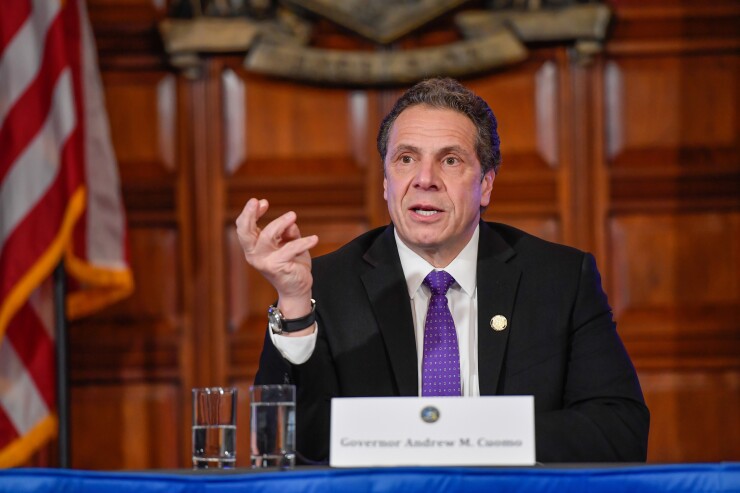New York Gov. Andrew Cuomo Tuesday outlined plans to close the state’s biggest budget deficit in more than half a decade amid slower tax collections.
Cuomo unveiled a $168 billion spending proposal for the 2019 fiscal year during his annual budget address Tuesday afternoon.

“In many ways this will be the most challenging budget we have ever had to do,” said Cuomo in his budget address. "It's really an economic transformation plan we are talking about."
The proposal includes $1 billion in revenue raisers and slight funding reductions for education, transportation and state agencies.
Cuomo said he will seek around $750 million in revenue from fees earned by nonprofit health insurance companies and proposed creating a new tax on opioid drug sales that would deliver around $171 million earmarked toward anti -addiction efforts. He also proposed deferring tax credits on a one-year basis for corporations that receive $2 million or more in credits, which would raise $300 million in new state revenue.
Cuomo stressed that the budgetary challenges are compounded by $2 billion in cuts to federal aid along with the new federal tax bill that caps federal income tax deductions for state and local taxes at $10,000. He has vowed to sue the federal government over the tax changes and indicated plans Tuesday to shift the state’s collection of taxes from an income-tax-based system to a payroll tax-based-approach that would soften the blow from Washington. The Department of Tax and Finance will be issuing a preliminary report on the tax restructuring proposal Wednesday, the governor said.
“Capping the federal deductibility of state and local taxes has constrained New York’s fiscal flexibility,” said Moody’s analyst Marcia Van Wagner in her Jan. 10 report. “With tax-related revenue actions now having a greater impact on taxpayers' disposable incomes, elected officials are likely to find more political risk in seeking additional tax increases or rate extensions than previously.”
A Dec. 18
Cuomo also said Tuesday he is open to exploring the legalization of recreational marijuana in light of neighboring Massachusetts recently legalizing cannabis and with New Jersey also close to following suit. He said the state’s Department of Health will study the potential economic and health impact for New York as well as consequences from legalization in surrounding states.
The legislature has until March 31 to adopt a new budget before the 2019 fiscal year commences on April 1. New York has bond ratings of Aa1 from Moody's Investors Service, and AA-plus from S&P Global Ratings, Fitch Ratings and Kroll Bond Rating Agency.





